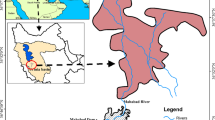Abstract
Owing to rational deep understanding of intrinsic nature of groundwater as common pool and decayable resources, together with, lack of withdrawal control by local states, groundwater depletion has been incredibly under consistent withdrawal. Under these circumstances, attempts have been made by users to maximize withdrawal without considering any limitation on account of lack of reliable withdrawal pattern. In this research, sustainable management of groundwater in south western part of Tehran plain has been evaluated by coupling simulation and optimization models of cooperative and non-cooperative approaches. The MODFLOW model and the Artificial Neural Network model are used for simulation of different scenarios after calibration and validation. Then, a non-linear optimization model is used for optimal allocation of groundwater to different water users. Results indicate that users may gain more benefit in early years of withdrawal in non-cooperative approach. However, this may have an adverse effect which implies a decreasing trend in the benefit in such a way that it reaches null in long term period, as this is reflected by dramatic drawdown of groundwater level and its depletion. In cooperative approach, rate of withdrawal from aquifer is determined by considering renewable water volume, together with, groundwater table drawdown constraint. In this approach, water users may gain less benefit than non-cooperative in early years of withdrawal, however, that will offset in 50 years period by means of more benefit.











Similar content being viewed by others
References
Behroozi A, Niksokhan MH, Nazariha M (2015) Developing a simulation-optimisation model for quantitative and qualitative control of urban run-off using best management practices. J Flood Risk Manag. https://doi.org/10.1111/jfr3.12210
Castillo D, Saysel AK (2005) Simulation of common pool resource field experiments: a behavioral model of collective action. Ecol Econ 55(3):420–436
Gordon HS (1954) The economic-theory of a common-property resource: the fishery. J Polit Econ 62:124–142
Hardin G (1968) The tragedy of the commons. Science 162(3859):1243–1248
Harou JJ, Lund JR (2008) Ending groundwater overdraft in hydrologic-economic systems. Hydrogeol J 16:1039–1055
Jafari F, Javadi S, Golmohammadi G, Karimi N, Mohammadi K (2016a) Numerical simulation of groundwater flow and aquifer-system compaction using simulation and InSAR technique: saveh basin. Iran Environ Earth Sci 75(9):833
Jafari F, Javadi S, Golmohammadi G, Mohammadi K, Khodadadi A (2016b) Groundwater risk mapping prediction using mathematical modeling and the monte carlo technique. Environ Earth Sci 75(6):491
Kamali A, Niksokhan MH (2017) Multi-objective optimization for sustainable groundwater management by developing of coupled quantity-quality simulation-optimization model. J Hydroinf. https://doi.org/10.2166/hydro.2017.007
Koundouri P (2004) Current issues in the economics of groundwater resource management. J Econ Surv 18:703–740
Loaiciga HA (2004) analytic game theoretic approach to ground-water extraction. J Hydrol 297(1):22–33
Madani K (2010) Game theory and water resources. J Hydrol 381(3):225–238
Madani K, Dinar A (2011) Exogenous regulatory institutions for sustainable management of common pool resources. Water Sci Policy Cent Riverside: 1–35
Madani K, Dinar A (2012a) Cooperative institutions for sustainable common pool resource management: application to groundwater. Water Resour Res 48(9):W09553. https://doi.org/10.1029/2011WR010849
Madani K, Dinar A (2012b) Non-cooperative institutions for sustainable common pool resource management: application to groundwater. Ecol Econ 74:34–45
Mccarthy N, Sadoulet E, Janvry AD (2001) Common pool resource appropriation under costly cooperation. J Environ Econ Manag 42:297–309
Neshat A, Pradhan B (2017) Evaluation of groundwater vulnerability to pollution using DRASTIC framework and GIS. Arab J Geosci 10(22):501
Ostrom E (1990) Governing the commons: the evolution of institutions for collective action. Cambridge University Press, Cambridge
Ostrom E (2010) Beyond markets and states: polycentric governance of complex economic systems. Am Econ Rev 641–672
Saberi L, Niksokhan MH (2017) Optimal waste load allocation using graph model for conflict resolution. Water Sci Technol. https://doi.org/10.2166/wst.2016.429
Vrba J, Van Der Gun J (2004) The world’s groundwater resources. Report Nr IP 2004-1, International Groundwater Resources Assessment Centre (IGRAC), Utrecht
Yousefi H, Zahedi S, Niksokhan MH (2017) Modifying the analysis made by water quality index using multi-criteria decision making methods. J Afr Earth Sci. https://doi.org/10.1016/j.jafrearsci.2017.11.019
Author information
Authors and Affiliations
Corresponding author
Rights and permissions
About this article
Cite this article
Moridi, A., Tabatabaie, M.R.M. & Esmaeelzade, S. Holistic Approach to Sustainable Groundwater Management in Semi-arid Regions. Int J Environ Res 12, 347–355 (2018). https://doi.org/10.1007/s41742-018-0080-4
Received:
Revised:
Accepted:
Published:
Issue Date:
DOI: https://doi.org/10.1007/s41742-018-0080-4




